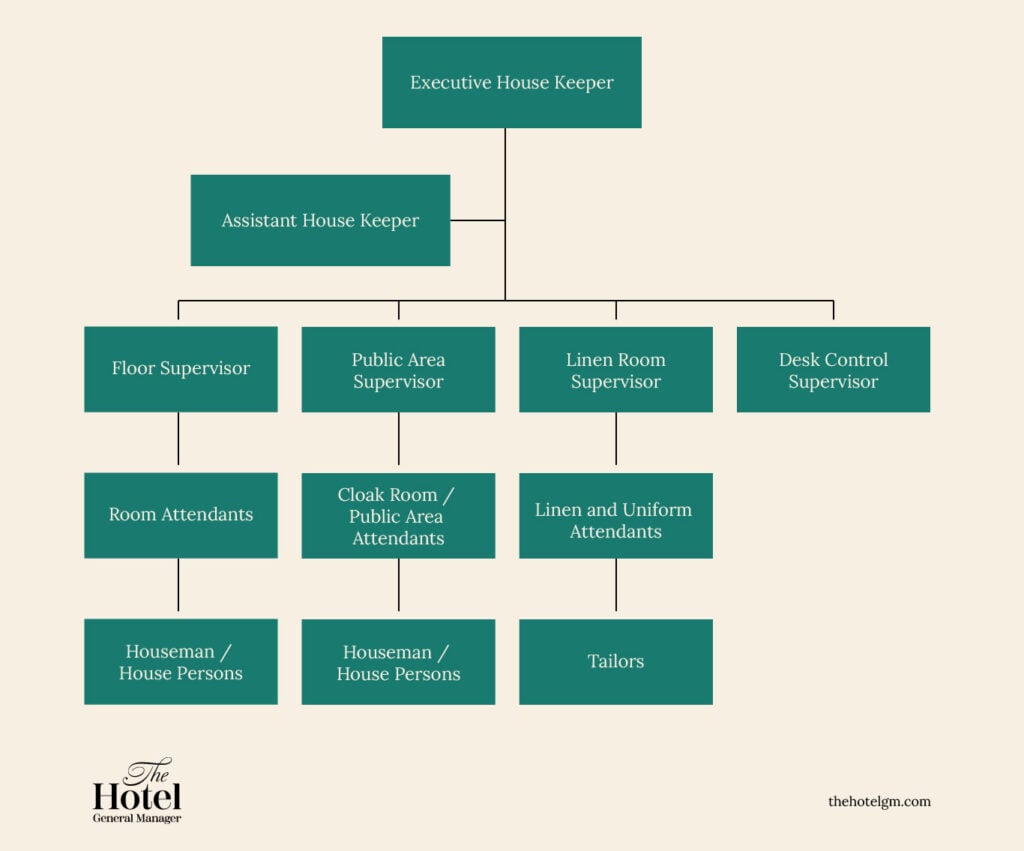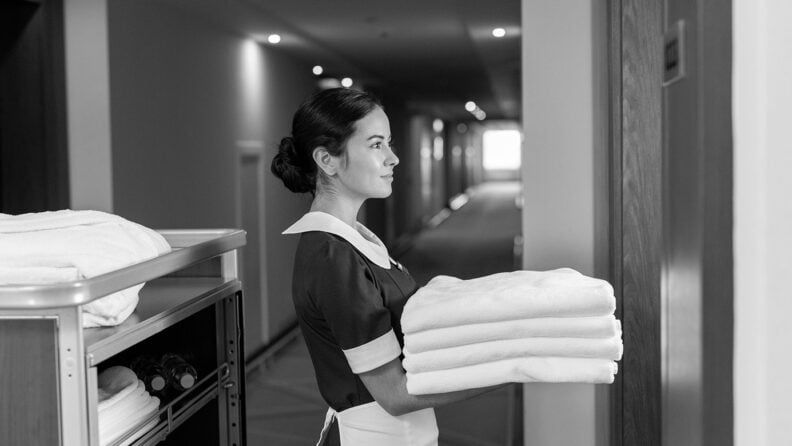When you think about staying at a hotel, it’s a lot like visiting someone’s home. Imagine walking into a friend’s house—everything is clean, tidy, and welcoming. You feel comfortable, relaxed, and cared for. That’s exactly what we, as experts in hotel housekeeping, aim to create for every guest.
Housekeeping is the heart of any hotel, just like keeping your home clean, which is the backbone of a happy household. With years of experience in the industry, we’ve learned that it’s more than just making beds and mopping floors. It’s about creating an environment where guests feel at ease, ensuring everything is spotless and organized, and handling the little details that make a big difference.
In this article, I’ll take you behind the scenes of hotel housekeeping to explain what it’s all about, why it’s so important, and how it works. Whether you’re curious about the role or just want to appreciate what goes into making your stay so comfortable, we’ve got you covered!
What Is Housekeeping In Hotels?
Basic Definition of Housekeeping: The daily cleaning, organizing, and maintaining of a property to ensure it is ready and comfortable for use.
Let's expand! Housekeeping in hospitality is all about keeping hotels, resorts, and other guest accommodations clean, organized, and comfortable. It involves making sure rooms, public areas, and other spaces look great and feel inviting for guests. Housekeeping is a key part of delivering a pleasant stay for anyone visiting a hotel or similar property, and is one of the most well-known hotel job positions.
Role Of Housekeeping In The Hospitality Industry
The role of housekeeping goes beyond cleaning. It includes ensuring that all guest areas are presentable and functional. Housekeeping staff are responsible for checking that everything in a room works, like lights, air conditioning, and appliances.
They also report damages or maintenance issues and make sure guests have everything they need during their stay.
Importance Of Hotel Housekeeping
Hotel housekeeping plays a crucial role in ensuring a positive guest experience and maintaining the property’s reputation.
- Enhances guest satisfaction by providing a clean and comfortable environment.
- Creates a positive impression, encouraging good reviews and repeat visits.
- Ensures hygiene and safety, contributing to the well-being of guests.
- Shows attention to detail, making guests feel cared for and valued.
- Supports a hotel’s reputation, as cleanliness is often a top priority for travelers.
- Prevents complaints and reduces potential negative feedback.
Housekeeping Department Organizational Chart
The housekeeping department typically has a clear structure to keep everything running smoothly. At the top, there’s the Executive Housekeeper, who oversees the whole department. Supervisors manage different sections, like rooms or public areas. Below them are housekeeping attendants and cleaners who handle the day-to-day tasks. This structure ensures that work is divided efficiently.

Different Sections In Housekeeping
The housekeeping department is divided into several sections, each handling specific tasks:
- Guest Rooms: Cleaning and preparing rooms for new guests.
- Public Areas: Keeping lobbies, hallways, and shared spaces spotless.
- Laundry: Washing and ironing linens, towels, and uniforms.
- Storage and Supplies: Managing cleaning products and other housekeeping items.
Each section works together to maintain the entire property.
Housekeeping Staffing Calculation
Staffing in housekeeping depends on the size and type of the property. Hotels use formulas to calculate how many staff members are needed. For example, they estimate the time it takes to clean a room and multiply that by the number of rooms.
This helps ensure they have enough people to finish the work efficiently without overstaffing. Supervisors also adjust staffing based on occupancy rates and busy periods.
Let’s break it down with a simple example:
Scenario:
- Hotel with 100 guest rooms.
- On average, it takes 30 minutes to clean one room.
- The occupancy rate is 80% (80 rooms need cleaning).
- Each housekeeper works an 8-hour shift.
Step 1: Calculate the total cleaning time needed.
80 rooms × 30 minutes per room = 2,400 minutes (or 40 hours)
Step 2: Calculate the number of housekeepers required.
One housekeeper can clean for 8 hours per shift:
40 hours ÷ 8 hours per housekeeper = 5 housekeepers
Adjustment for busy periods or additional tasks:
If public areas or extra tasks (like deep cleaning) need attention, you might add 1 or 2 additional housekeepers to ensure all work is completed on time.
Hotel Housekeeping FAQ
What is Hotel Guest Experience?
Hotel guest experience is all about making sure hotel guests have a comfortable and enjoyable stay from start to finish. It starts at check-in, where the hotel welcomes guests and ensures they feel valued right away, even before they see their hotel room.
During their stay, it’s important to handle guest requests quickly and efficiently, whether they need extra towels, room service, or help finding local attractions. Offering thoughtful touches like turndown service, where the bed is prepared for sleeping and sometimes small treats are left, adds an extra layer of care.
A great hotel guest experience focuses on making guests feel cared for, satisfied, and happy with every interaction.
What are the 9 Different Hotel Operations and Departments?
Hotels are big operations with many departments working together to make sure everything runs smoothly. Here’s a simple explanation of the nine main hotel industry operations and departments:
- Hotel General Manager: The general manager is the boss of the hotel. They oversee everything, make big decisions, and make sure all departments are doing their jobs well. Their goal is to keep the hotel running smoothly and guests happy.
- Floor Supervisor: Floor supervisors make sure the rooms and hallways are clean and in good shape. They check the work of housekeepers and handle any problems with cleanliness or room setups.
- Front Office/Front Desk: This is the first place guests go when they arrive. The front office staff handles check-ins, check-outs, reservations, and answers guest questions. They’re the face of the hotel and make the first impression.
- Housekeeping Manager & Staff Members: Housekeeping keeps the hotel clean. They clean rooms, replace towels, make beds, and ensure everything looks neat. They also handle small touches like turndown service to make the stay more comfortable.
- Food & Beverages: This department takes care of all the food and drinks in the hotel, from room service to restaurants and bars. They ensure guests enjoy their meals and drinks.
- Security and Maintenance: Security keeps guests and their belongings safe. Maintenance fixes anything broken in the hotel, like air conditioning, lights, or plumbing. They make sure the building is in good working condition.
- Human Resources: HR hires the hotel staff, handles training, and makes sure employees are happy and treated fairly. They also manage payroll and employee benefits.
- Sales & Marketing: This team promotes the hotel, creates ads, and finds ways to attract more guests. They might offer special deals or packages to bring in business.
- Finance Department: The finance team handles the money. They track income and expenses, manage budgets, and make sure the hotel stays profitable.
Each department plays a key role in making the hotel successful and providing a great experience for guests!
What are housekeeping duties and responsibilities?
Housekeeping duties and responsibilities are all about keeping the hotel clean, comfortable, and welcoming for guests. A room attendant, who is part of the housekeeping services team, has an important housekeeping job to do every day. Their main housekeeping duties include cleaning rooms, which means making beds with fresh bed sheets and bed linen, dusting surfaces, and ensuring everything looks neat.
They use cleaning supplies, like vacuum cleaners, brooms, and other cleaning equipment, to keep floors, carpets, and furniture spotless. Part of their housekeeping tasks also involves replacing toiletries in the bathrooms, such as soap and shampoo, so guests always have what they need.
Housekeepers use housekeeping carts to carry all their tools and supplies from room to room, making the job easier. They are also responsible for tidying common areas, like hallways and lobbies, to ensure the whole hotel feels clean and organized.
At the heart of it all is good housekeeping, which means doing all these tasks thoroughly and with attention to detail. This ensures guests have a pleasant stay and feel comfortable in a clean and well-maintained hotel.
What Next?
Don't forget to browse around the site for more great hotel management tips, templates, and tools. Plus, join The Hotel GM newsletter for expert tidbits sent right to your inbox!



